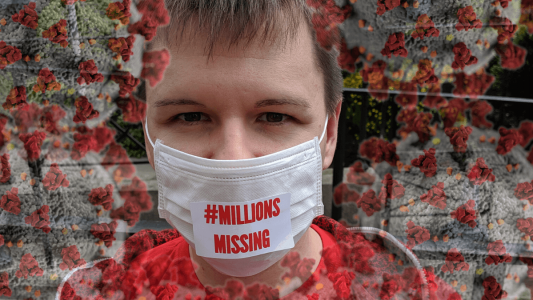#MEAction UK has sent an open letter to Matt Hancock asking him to recognise the harm caused by graded exercise therapy. We are calling on him to ensure all advice for people with ME, and those at risk of developing ME post-COVID, warns of the harm from graded exercise therapy. Join us by asking your MP to write to Matt Hancock too and telling them about your experience of ME.
NICE’s recent statement that graded exercise therapy (GET) is not recommended as treatment for post-COVID patients has made us redouble our efforts to stop people with ME being prescribed GET. Since the start of the coronavirus pandemic, people with myalgic encephalomyelitis (ME) have been concerned that a subset of COVID-19 patients will go on to develop ME. Unfortunately, we are already hearing from many COVID-19 survivors around the world that they are continuing to experience debilitating symptoms many months after first contracting COVID-19. NICE’s statement is the first sign that they recognise the harm done by GET, but they persist in their recommendation of this therapy for people with ME. A warning about this harmful treatment must be added immediately to the current ME/CFS guidelines.
Please email your MP and ask them to write to Matt Hancock, Secretary of State for Health and Social Care calling on him to:
- Request NICE adds an immediate warning on graded exercise therapy to its current ME/CFS guidelines, noting that it harms a majority of people with ME
- Ensure all government and NHS England advice on post-COVID treatment and rehabilitation addresses that patients could develop ME and that graded exercise therapy and activity harms this patient population
Join us in action now. NICE will not publish its new ME/CFS guidelines till April 2021 and we need to make sure that no more patients are harmed by graded exercise therapy.
Read our open letter:
Dear Mr Hancock,
#MEAction UK welcomes the recent statement from NICE that graded exercise therapy is not recommended for post-COVID patients. However, there is clear evidence of harm from graded exercise therapy for people with ME, which evidence suggests thousands of post-COVID patients could develop. NICE continues to refuse our requests to add a warning relating to the recommendation of graded exercise therapy for ME to its current ME/CFS guidelines.
Myalgic encephalomyelitis (ME) affects 250,000 people in the UK and causes profound and disabling ill-health. Up to 80% of people with ME experience a post-infectious onset, and COVID-19 could lead to a huge increase in the numbers of people living with this disease. Treatment of post COVID-19 patients and rehabilitation of COVID-19 sufferers needs to consider ME as a differential diagnosis and treat accordingly. This issue has been raised by Paul Garner, Professor of Infectious Diseases at Liverpool School of Tropical Medicine, in this British Medical Journal blog and highlighted in articles in The Atlantic, The Times and the New Scientist, among many others.
The link with COVID-19 and ongoing fatigue is also referred to in the NHS England guidelines for after-care for inpatients recovering from COVID (published in June 2020). The guidelines say “the clinical picture is that patients who have had COVID-19 are reporting extreme fatigue beyond the usual reported levels. ….. Of people who have been critically ill, 10% could develop chronic fatigue.” The guidelines then go on to recommend that treatments for extreme fatigue include graded exercise which it claims will “reduce the impact and the likelihood of fatigue becoming persistent or chronic”. This reference to graded activity conflicts with the NICE statement that graded exercise is not recommended to post-COVID patients.
#MEAction UK believes this is particularly relevant in light of the launch on 5 July of NHS England’s ‘Your COVID Recovery’ service which forms part of NHS England’s plans for COVID-19 rehabilitation. The service includes plans for survivors who are suffering significant ongoing health problems, including “enduring tiredness”, which we believe refers to the increasing evidence of long-term fatigue reported by COVID-19 patients. The plans for online aftercare will offer “exercise tutorials”.
The current guidance on treating ME/CFS is based on NICE guidelines. These guidelines are under review following significant criticisms from health professionals and patients. The present guidelines’ recommendations to treat patients with graded exercise therapy urgently need to be flagged as potentially harmful. In the US, the Centers for Disease Control and Prevention (CDC) removed GET as recommended treatment in 2017 due to the evidence of harm caused by this treatment.
We welcome the announcement of funding for DecodeME, a biomedical collaboration between researchers and people with ME/CFS, carers and the public. DecodeME is a DNA study that hopes to reveal genes that may play a part in susceptibility to ME/CFS. It is an excellent and long overdue first step, as Jeremy Hunt, Chair of the Health Select Committee, said in his recent letter to The Times. It could also prove particularly important if Covid-19 does lead to an increase in cases of ME. However, there is an urgent need for substantial ring-fenced funding for biomedical research into ME so that effective treatments can be identified.
#MEAction UK asks you to take immediate action to ensure that ME and post-COVID patients suffering from the symptoms of complex chronic disease are given effective advice and support:
- Request NICE adds an immediate warning on graded exercise therapy to its current ME/CFS guidelines, noting that it harms a majority of people with ME
- Ensure all government and NHS England advice on post-COVID treatment and rehabilitation addresses that patients could develop ME and that graded exercise and activity harms this patient population
Thank you for your time and we look forward to hearing from you.
Regards,
#MEAction UK






1 thought on “Take action: graded exercise harming people with ME and COVID long haulers”
Thank you. Is there a template email or letter please? This will hell the word get out faster.
Comments are closed.